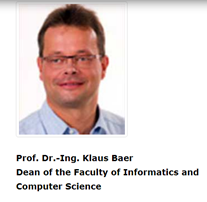GIU Faculty of Informatics & Computer Science
Get a future fast forward glimpse of Informatics & Computer Science and be among
the most highly demanded community of data experts in the world!
German International University (GIU) offers industry-focused and future-oriented Bachelors, Masters and PhD Degrees in the following specializations and majors of the Faculty of Informatics and Computer Science.
 English is the Teaching Language
English is the Teaching Language
Faculty Dean:

Study duration: 8 semesters (4 years) + 1.5 Years (Master's)
Degrees awarded: Bachelors, Masters of Science Degrees
Majors Offered:
- Applied Computer Science
- Data Sciences
- Software Engineering
- IT Security
- International Media Informatics
Why GIU Faculty of Computer Science?
GIU Faculty of Computer Science transfers German excellence in higher education to Egypt, Africa and the region and implements most innovative and employability orientated study programs & teaching approaches of German Systems to our valued students.
- GIU Faculty of Computer Science academic study programs focus on enabling students to extract new insightful knowledge from casual data for example the distance covered using mobile phones, dose adjustment of medications, traffic updates, etc.
- There are several industries where Computer Science can be applied that include, but not limited to car construction, software engineering, IT security, bioinformatics, etc.
- Our international teaching staff offers our students the universal scope of application of computer science to all sectors of industry and life to enable better user experience and useful insights of data collected to everyday use of applications and devices.
Privileges & Competitive Edge
- Close cooperation with industry (e.g. Curricula, Internships, Thesis writing)
- Practice-oriented teaching (e.g. case and simulation based)
- Emphasis on self-directed team work and analytical thinking
- Think critically and act responsibly (e.g. business ethics and sustainability issues)
- Academics with profound industrial experience (PhD plus)
- Prepare students for professional activities while taking into account ongoing developments in industry and the international environment.
Job Profiles
- Computer Science offers diverse graduate potentials progressive market-oriented programs of the GIU Faculty of Informatics & Computer Science
- Computer Science Experts with advanced necessary techniques, and accordingly, will choose how to apply it to promote a novel or modify an existing field of application.
- Highly valuable data scientists for almost every company that holds data.
- Value-adding Consultants who have variant core competencies of our graduates include: software modeling and object-oriented software design, application of agile process models, software quality assurance, model-based software development, development of mobile applications, program analysis and compiler construction, computer Graphics, game programming, etc.
- Skillful insightful computer companies’ managers who master a wide range of software engineering methods, software architectures and development technologies. This range of knowledge and skills make the graduates of this program highly market ready.
Major Descriptions, Courses Overview & Job Profiles
Applied Computer Science
Data Science

We now live in the era of big data. Over the last decade, a very large number of companies have been generating and retaining copious amounts of data in every field. This data is an untapped treasure of information and knowledge holding many exciting possibilities for the world!
Data Scientists are the ones responsible for uncovering the secrets held by this big data. Data Science is a discipline that combines fields of computer science (in particular, methods of artificial intelligence and machine learning) and statistics and applies them knowledgethem to a multitude of diverse fields that include shopping, marketing, healthcare, education, finance, and social networking.
Students in this program will learn how to analyze and extract knowledge from large and complex datasets. They will also learn how to visualize and present this information in a clear and insightful way. Students will also learn how to store and manage big data in an optimized way. Through a highly practice-oriented curriculum, our graduates will be highly valuable for almost every company that holds data.
Join this program and be a leading member of the most highly demanded community of data experts in the world!
First semester
| Course Name | ECTS |
| Mathematics I | 8 |
| Programming I | 6 |
| Physics | 5 |
| Digital Logic Design | 5 |
| English for Academic Purposes and Study Skils | 2 |
| German 1 | 2 |
Second semester
| Course Name | ECTS |
| Mathematics II | 4 |
| Programming II | 7 |
| Computer Networks | 5 |
| Theoretical Computer Science | 5 |
| Computer Organziation | 5 |
| Scientific Methods | 2 |
| German 2 | 2 |
Third semester
| Course Name | ECTS |
| Mathematics III | 4 |
| Programming III | 7 |
| Operating Systems | 5 |
| Databases | 6 |
| Data Structures & Algorithms | 6 |
| Communication and Presentation Skills | 2 |
| German 3 | 2 |
Fourth semester
| Course Names | ECTS |
| Mathematics IV | 4 |
| Software Engineering | 4 |
| Analysis and Design of Algorithms | 4 |
| Information Security | 4 |
| Introduction to Data Science | 4 |
| Introduction to Media Informatics | 4 |
| Research Paper Writing | 2 |
| German 4 | 2 |
Fifth semester
| Course Name | ECTS |
| Software Project I | 5 |
| Elective I | 5 |
| Elective II | 5 |
| Database Programming | 5 |
| Data Engineering and Visualization | 5 |
| Machine Learning ( Module subject III ) | 5 |
Sixth semester
| Course Name | ECTS |
| Project Management | 2 |
| Elective III | 6 |
| Elective IV | 6 |
| Big Data and NoSQL | 6 |
| Advanced Machine Learning | 6 |
| Introduction to Image Processing and Computer Vision | 6 |
Seventh semester
| Course Name | ECTS |
| Bachelor Thesis and Colloquium | 20 |
| Research Methodology | 5 |
| Workplace & Internship Readiness | 5 |
Eighth semester
| Course Name | ECTS |
| Internship | 20 |
| Internship-accompanying Seminar | 5 |
| Business Ethics | 5 |
ECTS: The European Credit Transfer and Accumulation System
*Changes may occur to this curriculum without prior notice.
Software Engineering

Software engineering is an important branch of computer science that focuses on the design, development, testing and maintenance of software.
The study of software engineering combines computer science, engineering, and project management. Software engineers create software solutions for business problems. To perform this task, software engineers combine their business sense with the programming expertise. Software engineers have to manage a list of requirements determined by their client that often include data management and storage, networking and communications, different application platforms (web, mobile, etc.), system administration, and embedded systems. The software development process has to manage this list of requirements according to a strict timeline. Accordingly, this software development process includes the intricate interplay of business needs, client input, design and development, implementation, quality assurance and testing, and the final product release.
Students in this program will be immersed in this experience through many courses. They will learn through realistic settings how to navigate through every part of the development process. They will also learn a wide range of software engineering methods, software architectures and development technologies. This range of knowledge and skills make the graduates of this program highly market ready.
The core competencies of our graduates include:
- Software modeling and object-oriented software design
- Application of agile process models
- Software Quality Assurance
- Model-based software development
- Development of mobile applications
- Program analysis and compiler construction
- Computer Graphics
- Game Programming
First semester
| Course Name | ECTS |
| Mathematics I | 8 |
| Programming I | 6 |
| Physics | 5 |
| Digital Logic Design | 5 |
| English for Academic Purposes and Study Skils | 2 |
| German 1 | 2 |
Second semester
| Course Name | ECTS |
| Mathematics II | 4 |
| Programming II | 7 |
| Computer Networks | 5 |
| Theoretical Computer Science | 5 |
| Computer Organziation | 5 |
| Scientific Methods | 2 |
| German 2 | 2 |
Third semester
| Course Name | ECTS |
| Mathematics III | 4 |
| Programming III | 7 |
| Operating Systems | 5 |
| Databases | 6 |
| Data Structures & Algorithms | 6 |
| Communication and Presentation Skills | 2 |
| German 3 | 2 |
Fourth semester
| Course Names | ECTS |
| Mathematics IV | 4 |
| Software Engineering | 4 |
| Analysis and Design of Algorithms | 4 |
| Information Security | 4 |
| Introduction to Data Science | 4 |
| Introduction to Media Informatics | 4 |
| Research Paper Writing | 2 |
| German 4 | 2 |
Fifth semester
| Course Name | ECTS |
| Software Project I | 5 |
| Elective I | 5 |
| Elective II | 5 |
| Requirements Engineering | 5 |
| Software Design and Architecture | 5 |
| Software Construction and Testing | 5 |
Sixth semester
| Course Name | ECTS |
| Project Management | 2 |
| Elective III | 6 |
| Elective IV | 6 |
| Software Cloud Computing | 6 |
| Software Mobile Development | 6 |
| Software Project II | 6 |
Seventh semester
| Course Name | ECTS |
| Bachelor Thesis and Colloquium | 20 |
| Research Methodology | 5 |
| Workplace & Internship Readiness | 5 |
Eighth semester
| Course Name | ECTS |
| Internship | 20 |
| Internship-accompanying Seminar | 5 |
| Business Ethics | 5 |
ECTS: The European Credit Transfer and Accumulation System
*Changes may occur to this curriculum without prior notice.
IT Security

Cyber-attacks cost companies billions of dollars annually. Data breaches, exposure to malware, and denial of service attacks, among many others, often wreak havoc on the digital infrastructure of companies, leading in some cases to the complete crippling of the company’s core systems. Security professionals are the front line of defense against these attacks. In companies with critical and vulnerable infrastructure, they can be among the top paid employees in the company.
The study of IT security encompasses a set of theoretical and practical concepts to achieve the objectives of confidentiality, integrity, availability and authenticity of digital information. Students in this program will be exposed to the world of cyber attacks and actively practice the implementation of protective measures against these attacks.
The program covers three main branches of IT security: information security, digital forensics, and pentesting. In information security, the students learn the foundations of cyber security and also learn how to conduct a thorough risk assessment of the company’s distributed systems. In digital forensics, the students learn how to collect, process, and analyze security-related data and compile evidence for vulnerabilities and attacks. Finally, the students will learn how to evaluate the competency of their protective measures by selecting and executing suitable penetration tests for their systems.
First semester
| Course Name | ECTS |
| Mathematics I | 8 |
| Programming I | 6 |
| Physics | 5 |
| Digital Logic Design | 5 |
| English for Academic Purposes and Study Skils | 2 |
| German 1 | 2 |
Second semester
| Course Name | ECTS |
| Mathematics II | 4 |
| Programming II | 7 |
| Computer Networks | 5 |
| Theoretical Computer Science | 5 |
| Computer Organziation | 5 |
| Scientific Methods | 2 |
| German 2 | 2 |
Third semester
| Course Name | ECTS |
| Mathematics III | 4 |
| Programming III | 7 |
| Operating Systems | 5 |
| Databases | 6 |
| Data Structures & Algorithms | 6 |
| Communication and Presentation Skills | 2 |
| German 3 | 2 |
Fourth semester
| Course Names | ECTS |
| Mathematics IV | 4 |
| Software Engineering | 4 |
| Analysis and Design of Algorithms | 4 |
| Information Security | 4 |
| Introduction to Data Science | 4 |
| Introduction to Media Informatics | 4 |
| Research Paper Writing | 2 |
| German 4 | 2 |
Fifth semester
| Course Name | ECTS |
| Software Project I | 5 |
| Elective I | 5 |
| Elective II | 5 |
| Cryptography | 5 |
| Software and Mobile Devices Security | 5 |
| Digital Forensics | 5 |
Sixth semester
| Course Name | ECTS |
| Project Management | 2 |
| Elective III | 6 |
| Elective IV | 6 |
| Network Security | 6 |
| Business Continuity and Risk Management | 6 |
| Ethical Hacking and Peneteration Testing | 6 |
Seventh semester
| Course Name | ECTS |
| Bachelor Thesis and Colloquium | 20 |
| Research Methodology | 5 |
| Workplace & Internship Readiness | 5 |
Eighth semester
| Course Name | ECTS |
| Internship | 20 |
| Internship-accompanying Seminar | 5 |
| Business Ethics | 5 |
ECTS: The European Credit Transfer and Accumulation System
*Changes may occur to this curriculum without prior notice.
Media Informatics

Media Informatics is a Computer Science Program where students will learn how to design and implement digital applications on the field of new media. In media informatics, the students are exposed to the techniques of recording, production, to the distribution channels and the necessary end devices have been continuously digitalized in recent years. The graduates of Media Informatics course will receive the appropriate tools to successfully manage with this dynamic development and speak the languages of these modern networked technologies in several ways.
The growing importance of media-related technologies and applications in the information technology (such as the trend towards Web-based solutions and mobile applications) makes the graduates of Media Informatics attractive for the economy to work on tasks that go beyond the core areas of the media industry. Media Informatics graduates will be able to work on integrative projects in the field of communication and media. Graduates will have various career prospects in a wide range of industries, from media-related companies, consulting firms and software houses to classical product manufacturing industries (e.g. automotive industry).
First semester
| Course Name | ECTS |
| Mathematics I | 8 |
| Programming I | 6 |
| Physics | 5 |
| Digital Logic Design | 5 |
| English for Academic Purposes and Study Skils | 2 |
| German 1 | 2 |
Second semester
| Course Name | ECTS |
| Mathematics II | 4 |
| Programming II | 7 |
| Computer Networks | 5 |
| Theoretical Computer Science | 5 |
| Computer Organziation | 5 |
| Scientific Methods | 2 |
| German 2 | 2 |
Third semester
| Course Name | ECTS |
| Mathematics III | 4 |
| Programming III | 7 |
| Operating Systems | 5 |
| Databases | 6 |
| Data Structures & Algorithms | 6 |
| Communication and Presentation Skills | 2 |
| German 3 | 2 |
Fourth semester
| Course Names | ECTS |
| Mathematics IV | 4 |
| Software Engineering | 4 |
| Analysis and Design of Algorithms | 4 |
| Information Security | 4 |
| Introduction to Data Science | 4 |
| Introduction to Media Informatics | 4 |
| Research Paper Writing | 2 |
| German 4 | 2 |
Fifth semester
| Course Name | ECTS |
| Software Project I | 5 |
| Elective I | 5 |
| Elective II | 5 |
| Web Programming | 5 |
| Human Computer Interaction | 5 |
| Computer Graphics | 5 |
Sixth semester
| Course Name | ECTS |
| Project Management | 2 |
| Elective III | 6 |
| Elective IV | 6 |
| 3D Design | 6 |
| Mobile Development | 6 |
| Media Informatics Project | 6 |
Seventh semester
| Course Name | ECTS |
| Bachelor Thesis and Colloquium | 20 |
| Research Methodology | 5 |
| Workplace & Internship Readiness | 5 |
Eighth semester
| Course Name | ECTS |
| Internship | 20 |
| Internship-accompanying Seminar | 5 |
| Business Ethics | 5 |
ECTS: The European Credit Transfer and Accumulation System
*Changes may occur to this curriculum without prior notice.